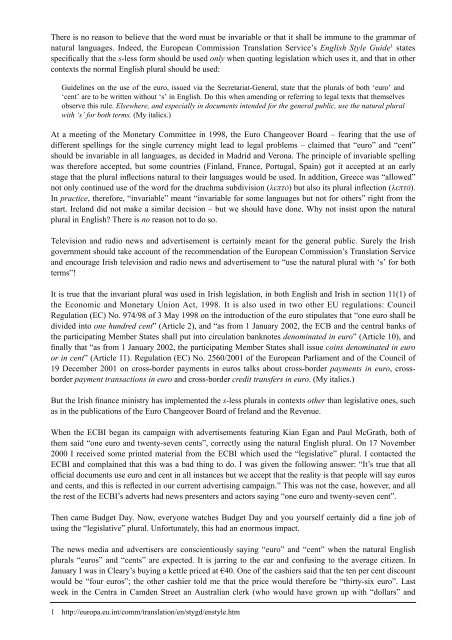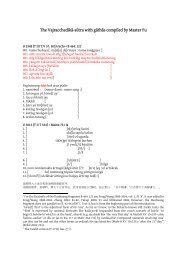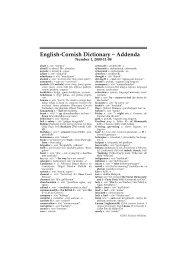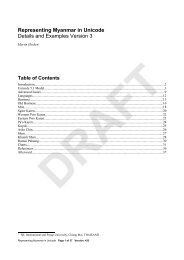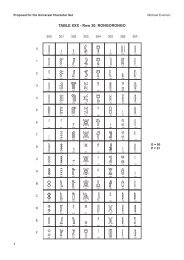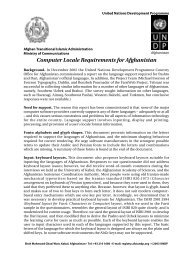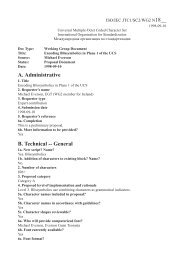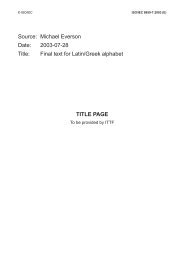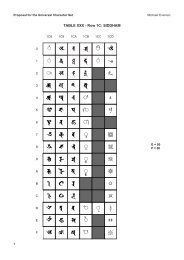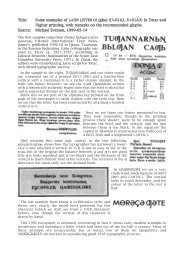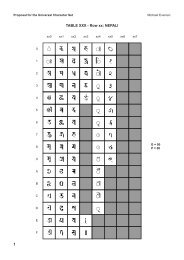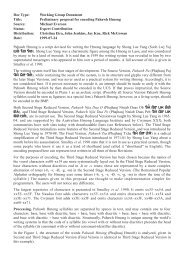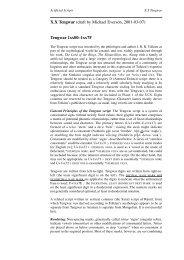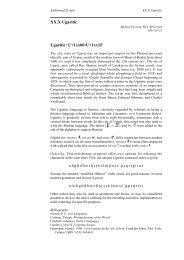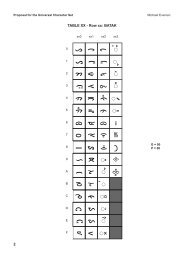open letter to the Irish Minister for Finance - Evertype
open letter to the Irish Minister for Finance - Evertype
open letter to the Irish Minister for Finance - Evertype
Create successful ePaper yourself
Turn your PDF publications into a flip-book with our unique Google optimized e-Paper software.
There is no reason <strong>to</strong> believe that <strong>the</strong> word must be invariable or that it shall be immune <strong>to</strong> <strong>the</strong> grammar of<br />
natural languages. Indeed, <strong>the</strong> European Commission Translation Service’s English Style Guide 1 states<br />
specifically that <strong>the</strong> s-less <strong>for</strong>m should be used only when quoting legislation which uses it, and that in o<strong>the</strong>r<br />
contexts <strong>the</strong> normal English plural should be used:<br />
Guidelines on <strong>the</strong> use of <strong>the</strong> euro, issued via <strong>the</strong> Secretariat-General, state that <strong>the</strong> plurals of both ‘euro’ and<br />
‘cent’ are <strong>to</strong> be written without ‘s’ in English. Do this when amending or referring <strong>to</strong> legal texts that <strong>the</strong>mselves<br />
observe this rule. Elsewhere, and especially in documents intended <strong>for</strong> <strong>the</strong> general public, use <strong>the</strong> natural plural<br />
with ‘s’ <strong>for</strong> both terms. (My italics.)<br />
At a meeting of <strong>the</strong> Monetary Committee in 1998, <strong>the</strong> Euro Changeover Board – fearing that <strong>the</strong> use of<br />
different spellings <strong>for</strong> <strong>the</strong> single currency might lead <strong>to</strong> legal problems – claimed that “euro” and “cent”<br />
should be invariable in all languages, as decided in Madrid and Verona. The principle of invariable spelling<br />
was <strong>the</strong>re<strong>for</strong>e accepted, but some countries (Finland, France, Portugal, Spain) got it accepted at an early<br />
stage that <strong>the</strong> plural inflections natural <strong>to</strong> <strong>the</strong>ir languages would be used. In addition, Greece was “allowed”<br />
not only continued use of <strong>the</strong> word <strong>for</strong> <strong>the</strong> drachma subdivision (ÏÂappleÙfi) but also its plural inflection (ÏÂappleÙ¿).<br />
In practice, <strong>the</strong>re<strong>for</strong>e, “invariable” meant “invariable <strong>for</strong> some languages but not <strong>for</strong> o<strong>the</strong>rs” right from <strong>the</strong><br />
start. Ireland did not make a similar decision – but we should have done. Why not insist upon <strong>the</strong> natural<br />
plural in English? There is no reason not <strong>to</strong> do so.<br />
Television and radio news and advertisement is certainly meant <strong>for</strong> <strong>the</strong> general public. Surely <strong>the</strong> <strong>Irish</strong><br />
government should take account of <strong>the</strong> recommendation of <strong>the</strong> European Commission’s Translation Service<br />
and encourage <strong>Irish</strong> television and radio news and advertisement <strong>to</strong> “use <strong>the</strong> natural plural with ‘s’ <strong>for</strong> both<br />
terms”!<br />
It is true that <strong>the</strong> invariant plural was used in <strong>Irish</strong> legislation, in both English and <strong>Irish</strong> in section 11(1) of<br />
<strong>the</strong> Economic and Monetary Union Act, 1998. It is also used in two o<strong>the</strong>r EU regulations: Council<br />
Regulation (EC) No. 974/98 of 3 May 1998 on <strong>the</strong> introduction of <strong>the</strong> euro stipulates that “one euro shall be<br />
divided in<strong>to</strong> one hundred cent” (Article 2), and “as from 1 January 2002, <strong>the</strong> ECB and <strong>the</strong> central banks of<br />
<strong>the</strong> participating Member States shall put in<strong>to</strong> circulation banknotes denominated in euro” (Article 10), and<br />
finally that “as from 1 January 2002, <strong>the</strong> participating Member States shall issue coins denominated in euro<br />
or in cent” (Article 11). Regulation (EC) No. 2560/2001 of <strong>the</strong> European Parliament and of <strong>the</strong> Council of<br />
19 December 2001 on cross-border payments in euros talks about cross-border payments in euro, crossborder<br />
payment transactions in euro and cross-border credit transfers in euro. (My italics.)<br />
But <strong>the</strong> <strong>Irish</strong> finance ministry has implemented <strong>the</strong> s-less plurals in contexts o<strong>the</strong>r than legislative ones, such<br />
as in <strong>the</strong> publications of <strong>the</strong> Euro Changeover Board of Ireland and <strong>the</strong> Revenue.<br />
When <strong>the</strong> ECBI began its campaign with advertisements featuring Kian Egan and Paul McGrath, both of<br />
<strong>the</strong>m said “one euro and twenty-seven cents”, correctly using <strong>the</strong> natural English plural. On 17 November<br />
2000 I received some printed material from <strong>the</strong> ECBI which used <strong>the</strong> “legislative” plural. I contacted <strong>the</strong><br />
ECBI and complained that this was a bad thing <strong>to</strong> do. I was given <strong>the</strong> following answer: “It’s true that all<br />
official documents use euro and cent in all instances but we accept that <strong>the</strong> reality is that people will say euros<br />
and cents, and this is reflected in our current advertising campaign.” This was not <strong>the</strong> case, however, and all<br />
<strong>the</strong> rest of <strong>the</strong> ECBI’s adverts had news presenters and ac<strong>to</strong>rs saying “one euro and twenty-seven cent”.<br />
Then came Budget Day. Now, everyone watches Budget Day and you yourself certainly did a fine job of<br />
using <strong>the</strong> “legislative” plural. Un<strong>for</strong>tunately, this had an enormous impact.<br />
The news media and advertisers are conscientiously saying “euro” and “cent” when <strong>the</strong> natural English<br />
plurals “euros” and “cents” are expected. It is jarring <strong>to</strong> <strong>the</strong> ear and confusing <strong>to</strong> <strong>the</strong> average citizen. In<br />
January I was in Cleary’s buying a kettle priced at €40. One of <strong>the</strong> cashiers said that <strong>the</strong> ten per cent discount<br />
would be “four euros”; <strong>the</strong> o<strong>the</strong>r cashier <strong>to</strong>ld me that <strong>the</strong> price would <strong>the</strong>re<strong>for</strong>e be “thirty-six euro”. Last<br />
week in <strong>the</strong> Centra in Camden Street an Australian clerk (who would have grown up with “dollars” and<br />
1 http://europa.eu.int/comm/translation/en/stygd/enstyle.htm


